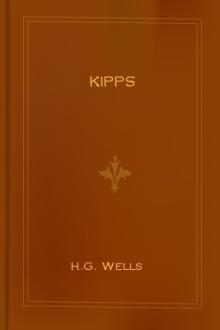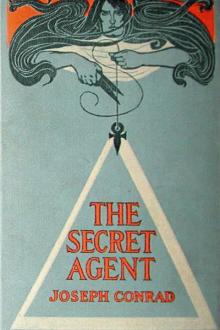The Secret Agent: A Simple Tale, Joseph Conrad [i can read book club .txt] 📗

- Author: Joseph Conrad
Book online «The Secret Agent: A Simple Tale, Joseph Conrad [i can read book club .txt] 📗». Author Joseph Conrad
She said composedly:
“I remember now! He didn’t bank in his own name. He told me once that it was on deposit in the name of Prozor.”
“You are sure?”
“Certain.”
“You don’t think the bank had any knowledge of his real name? Or anybody in the bank or—”
She shrugged her shoulders.
“How can I know? Is it likely, Tom?
“No. I suppose it’s not likely. It would have been more comfortable to know. . . . Here we are. Get out first, and walk straight in. Move smartly.”
He remained behind, and paid the cabman out of his own loose silver. The programme traced by his minute foresight was carried out. When Mrs Verloc, with her ticket for St Malo in her hand, entered the ladies’ waiting-room, Comrade Ossipon walked into the bar, and in seven minutes absorbed three goes of hot brandy and water.
“Trying to drive out a cold,” he explained to the barmaid, with a friendly nod and a grimacing smile. Then he came out, bringing out from that festive interlude the face of a man who had drunk at the very Fountain of Sorrow. He raised his eyes to the clock. It was time. He waited.
Punctual, Mrs Verloc came out, with her veil down, and all black—black as commonplace death itself, crowned with a few cheap and pale flowers. She passed close to a little group of men who were laughing, but whose laughter could have been struck dead by a single word. Her walk was indolent, but her back was straight, and Comrade Ossipon looked after it in terror before making a start himself.
The train was drawn up, with hardly anybody about its row of open doors. Owing to the time of the year and to the abominable weather there were hardly any passengers. Mrs Verloc walked slowly along the line of empty compartments till Ossipon touched her elbow from behind.
“In here.”
She got in, and he remained on the platform looking about. She bent forward, and in a whisper:
“What is it, Tom? Is there any danger? Wait a moment. There’s the guard.”
She saw him accost the man in uniform. They talked for a while. She heard the guard say “Very well, sir,” and saw him touch his cap. Then Ossipon came back, saying: “I told him not to let anybody get into our compartment.”
She was leaning forward on her seat. “You think of everything. . . . You’ll get me off, Tom?” she asked in a gust of anguish, lifting her veil brusquely to look at her saviour.
She had uncovered a face like adamant. And out of this face the eyes looked on, big, dry, enlarged, lightless, burnt out like two black holes in the white, shining globes.
“There is no danger,” he said, gazing into them with an earnestness almost rapt, which to Mrs Verloc, flying from the gallows, seemed to be full of force and tenderness. This devotion deeply moved her—and the adamantine face lost the stern rigidity of its terror. Comrade Ossipon gazed at it as no lover ever gazed at his mistress’s face. Alexander Ossipon, anarchist, nicknamed the Doctor, author of a medical (and improper) pamphlet, late lecturer on the social aspects of hygiene to working men’s clubs, was free from the trammels of conventional morality—but he submitted to the rule of science. He was scientific, and he gazed scientifically at that woman, the sister of a degenerate, a degenerate herself—of a murdering type. He gazed at her, and invoked Lombroso, as an Italian peasant recommends himself to his favourite saint. He gazed scientifically. He gazed at her cheeks, at her nose, at her eyes, at her ears. . . . Bad! . . . Fatal! Mrs Verloc’s pale lips parting, slightly relaxed under his passionately attentive gaze, he gazed also at her teeth. . . . Not a doubt remained . . . a murdering type. . . . If Comrade Ossipon did not recommend his terrified soul to Lombroso, it was only because on scientific grounds he could not believe that he carried about him such a thing as a soul. But he had in him the scientific spirit, which moved him to testify on the platform of a railway station in nervous jerky phrases.
“He was an extraordinary lad, that brother of yours. Most interesting to study. A perfect type in a way. Perfect!”
He spoke scientifically in his secret fear. And Mrs Verloc, hearing these words of commendation vouchsafed to her beloved dead, swayed forward with a flicker of light in her sombre eyes, like a ray of sunshine heralding a tempest of rain.
“He was that indeed,” she whispered softly, with quivering lips. “You took a lot of notice of him, Tom. I loved you for it.”
“It’s almost incredible the resemblance there was between you two,” pursued Ossipon, giving a voice to his abiding dread, and trying to conceal his nervous, sickening impatience for the train to start. “Yes; he resembled you.”
These words were not especially touching or sympathetic. But the fact of that resemblance insisted upon was enough in itself to act upon her emotions powerfully. With a little faint cry, and throwing her arms out, Mrs Verloc burst into tears at last.
Ossipon entered the carriage, hastily closed the door and looked out to see the time by the station clock. Eight minutes more. For the first three of these Mrs Verloc wept violently and helplessly without pause or interruption. Then she recovered somewhat, and sobbed gently in an abundant fall of tears. She tried to talk to her saviour, to the man who was the messenger of life.
“Oh, Tom! How could I fear to die after he was taken away from me so cruelly! How could I! How could I be such a coward!”
She lamented aloud her love of life, that life without grace or charm, and almost without decency, but of an exalted faithfulness of purpose, even unto murder. And, as often happens in the lament of poor humanity, rich in suffering but indigent in words, the truth—the very cry of truth—was found in a worn and artificial shape picked up somewhere among the phrases of sham sentiment.
“How could I be so afraid of death! Tom, I tried. But I am afraid. I tried to do away with myself. And I couldn’t. Am I hard? I suppose the cup of horrors was not full enough for such as me. Then when you came. . . . ”
She paused. Then in a gust of confidence and gratitude, “I will live all my days for you, Tom!” she sobbed out.
“Go over into the other corner of the carriage, away from the platform,” said Ossipon solicitously. She let her saviour settle her comfortably, and he watched the coming on of another crisis of weeping, still more violent than the first. He watched the symptoms with a sort of medical air, as if counting seconds. He heard the guard’s whistle at last. An involuntary contraction of the upper lip bared his teeth with all the aspect of savage resolution as he felt the train beginning to move. Mrs Verloc heard and felt nothing, and Ossipon, her saviour, stood still. He felt the train roll quicker, rumbling heavily to the sound of the woman’s loud sobs, and then crossing the carriage in two long strides he opened the door deliberately, and leaped out.
He had leaped out at the very end of the platform; and such was his determination in sticking to his desperate plan that he managed by a sort of miracle, performed almost in the air, to slam to the door of the carriage. Only then did he find himself rolling head over heels like a shot rabbit. He was bruised, shaken, pale as death, and out of breath when he got up. But he was calm, and perfectly able to meet the excited crowd of railway men who had gathered round him in a moment. He explained, in gentle and convincing tones, that his wife had started at a moment’s notice for Brittany to her dying mother; that, of course, she was greatly up-set, and he considerably concerned at her state; that he was trying to cheer her up, and had absolutely failed to notice at first that the train was moving out. To the general exclamation, “Why didn’t you go on to Southampton, then, sir?” he objected the inexperience of a young sister-in-law left alone in the house with three small children, and her alarm at his absence, the telegraph offices being closed. He had acted on impulse. “But I don’t think I’ll ever try that again,” he concluded; smiled all round; distributed some small change, and marched without a limp out of the station.
Outside, Comrade Ossipon, flush of safe banknotes as never before in his life, refused the offer of a cab.
“I can walk,” he said, with a little friendly laugh to the civil driver.
He could walk. He walked. He crossed the bridge. Later on the towers of the Abbey saw in their massive immobility the yellow bush of his hair passing under the lamps. The lights of Victoria saw him too, and Sloane Square, and the railings of the park. And Comrade Ossipon once more found himself on a bridge. The river, a sinister marvel of still shadows and flowing gleams mingling below in a black silence, arrested his attention. He stood looking over the parapet for a long time. The clock tower boomed a brazen blast above his drooping head. He looked up at the dial. . . . Half-past twelve of a wild night in the Channel.
And again Comrade Ossipon walked. His robust form was seen that night in distant parts of the enormous town slumbering monstrously on a carpet of mud under a veil of raw mist. It was seen crossing the streets without life and sound, or diminishing in the interminable straight perspectives of shadowy houses bordering empty roadways lined by strings of gas lamps. He walked through Squares, Places, Ovals, Commons, through monotonous streets with unknown names where the dust of humanity settles inert and hopeless out of the stream of life. He walked. And suddenly turning into a strip of a front garden with a mangy grass plot, he let himself into a small grimy house with a latch-key he took out of his pocket.
He threw himself down on his bed all dressed, and lay still for a whole quarter of an hour. Then he sat up suddenly, drawing up his knees, and clasping his legs. The first dawn found him open-eyed, in that same posture. This man who could walk so long, so far, so aimlessly, without showing a sign of fatigue, could also remain sitting still for hours without stirring a limb or an eyelid. But when the late sun sent its rays into the room he unclasped his hands, and fell back on the pillow. His eyes stared at the ceiling. And suddenly they closed. Comrade Ossipon slept in the sunlight.
CHAPTER XIIIThe enormous iron padlock on the doors of the wall cupboard was the only object in the room on which the eye could rest without becoming afflicted by the miserable unloveliness of forms and the poverty of material. Unsaleable in the ordinary course of business on account of its noble proportions, it had been ceded to the Professor for a few pence by a marine dealer in the east of London. The room was large, clean, respectable, and poor with that poverty suggesting the starvation of every human need except mere bread. There was nothing on the walls but the paper, an expanse of arsenical green, soiled with indelible smudges here and there, and with stains resembling faded maps of uninhabited continents.
At a deal table near a window sat Comrade Ossipon, holding his head between his fists. The Professor, dressed in his only suit of shoddy tweeds, but flapping to and fro on the bare boards a pair of incredibly dilapidated slippers, had thrust his hands deep into the overstrained pockets of his jacket. He was relating to his robust guest a visit he had lately been paying to the Apostle Michaelis. The Perfect Anarchist had even been unbending a little.
“The fellow didn’t know anything of Verloc’s death. Of course! He never looks at the newspapers. They make him too sad, he says. But never mind. I walked into his cottage. Not a soul anywhere. I had to shout half-a-dozen times before he answered me. I thought he was fast asleep yet, in bed. But not at all. He had been writing his book for four hours already. He sat in that tiny cage in a litter of manuscript. There was a half-eaten raw carrot on





Comments (0)